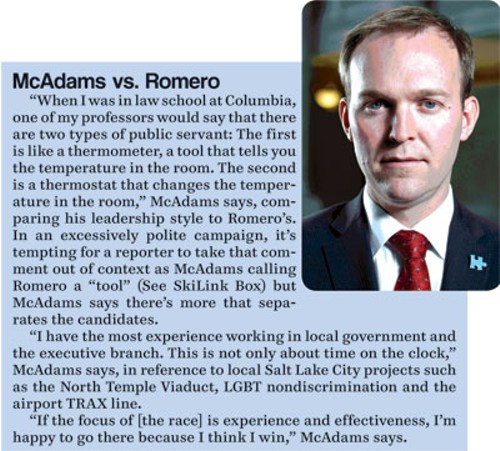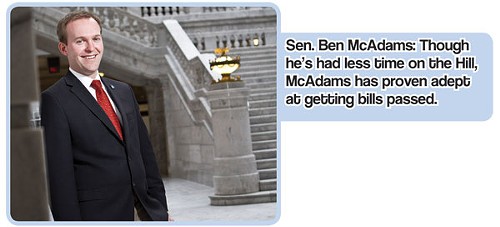Page 2 of 3
When Romero says that he is “Salt Lake County,” his roots in the community can back it up. He currently works at Zions Bank doing community banking for cities, towns and other local entities. Before that, he was a partner in Salt Lake City legal firm Jones Waldo from 2003 to 2007. He’s also sat on numerous boards, including the Utah Hispanic Chamber of Commerce, and was president of the Utah Minority Bar Association. But Romero says before his career success, his upbringing was much humbler.
“I grew up as a product of a public-schoolteacher mother and a stepdad that worked out at ATK in Magna,” Romero says. “I understand what it means to work every day and live paycheck to paycheck.” As the child of divorced parents, Romero found his time split between West Valley City and attending school on the east side where his mother taught. With a foot in both worlds, Romero grew up understanding both sides of the county, culturally and politically.
Now, though Romero doesn’t speak Spanish and lives on the east side in a district that’s more than 90 percent Caucasian, he and his wife send their two children to a school on the west side to learn Spanish.
Romero also says that as a Catholic Latino, “I’ve had many opportunities to be converted into this community’s major religion, but I always had a strong sense of who I was.” As the state’s first minority leader in the Legislature, Romero says that when representing Utah to other legislatures and other states, he’s a passionate cheerleader for Utah.
Inside the state, Romero says, he knows how to get things done—stressing diplomacy over flashy statements. While his bill performance may be lacking, Romero claims with pride his defense of Democrats on the Hill. Romero says he was first to call out former Sen. Chris Buttars, R-West Jordan, for his racially charged “black baby” comments on the Hill in 2008. He also had to orchestrate some budgetary wizardry to find the funds to help KUER do its We Shall Remain documentary series on American Indians in Utah, during a session when the economy was still in the dumps.
That being said, Romero admits that for a Democrat, he’s a fiscal conservative, and if elected as county mayor, he wouldn’t be asking voters to bond grandiose projects like a county convention center until core needs are addressed. He’s also not likely to bend over backward to attract new, large, out-of-state businesses when more resources could go to growing small local businesses already in the county, a business community he’s already made the rounds with multiple times in his current job as a community banker.
At the helm of the county, Romero could also broker wider conversations about policy, much like he and former House Leader Rep. David Litvack, D-Salt Lake City, did by hosting a public forum on alcohol policy in Utah and giving a platform to bar and restaurant owners and average Utahns, rather than just the Republican leadership voices in the Legislature.
Sen. Ben McAdams: From Earth Stains to Turning the Dial Against Discrimination
McAdams has a well-rehearsed, but sincere, sales pitch he delivers to delegates. City Weekly shadowed his tour of delegates in the Avenues as McAdams, assisted by staff, cruised through the heavily Democratic neighborhoods trying to meet and greet 30 delegates a night. The “greet” part always comes with congratulations to delegates for being nominated and letting them know he’s accessible and available any time they have questions.
This commitment to transparency is one put to the test when a City Weekly reporter asks McAdams’ about the band in which he played the electric guitar in high school. McAdams could not remember the band’s name, so he immediately called up a former bandmate—also a delegate—and put him on speakerphone. He confirms the group never had an official name … while McAdams congratulates him on becoming a delegate.
“I don’t know if we had [a name],” the staticky voice says before coming back with, “Was it Earth Stains?”
An homage to McAdams’ early days as an environmental advocate, perhaps? McAdams was the president of an environmental club in his high school before attending the University of Utah, where he took over as president of the College Democrats, succeeding his peer Charlie Luke, who now serves as Salt Lake City’s’ newest councilman.
For McAdams, it’s hard to trace when it was that the political bug really bit. He dabbled in politics in high school and college, but it wasn’t until his mission in Brazil, he says, where he saw how education inequality seemed to hold back entire swathes of the country’s citizens, and how he recognized the impact of bad policy on a people and the necessary potential of good public policies (For more on McAdams’ faith and politics, see “Choose the Radical,” City Weekly, Sept. 28, 2011).
“It’s just something that gets into your blood,” McAdams says of his political zeal.
A sure sign that politics is in your blood is a willingness to sell your blood—or at least your plasma—to supplement the poor pay that comes with working Democratic campaigns.
McAdams was a regular plasma donor during the waning days of the 1998 Scott Leckman for U.S. Senate campaign. Even after he had parlayed an internship with the Clinton White House into a temporary gig traveling to foreign nations to help prep for the Clintons before they landed in a country, McAdams found himself forced to live off plasma money.
“I would always pack in my bag a loaf of bread and peanut butter and jelly because I couldn’t afford to eat out,” McAdams says with a laugh.
Now, after having worked in New York City and Utah in securities and corporate law, and having rounded out his third successful legislative session with his name attached to the lion’s share of bills passed by his party, McAdams does eat a little bit better, but is still hungry—now for an executive seat.
Following McAdams on the campaign trail, it’s safe to say that for many in Salt Lake City’s Avenues, their only qualm with McAdams’ campaign is the idea of losing him as their senator. In one home, gay couple who’d been together for 18 years had nothing but praise for McAdams and simply told him to have his staff “back off” from calling them. In another, the delegate stopped to show his photo in a Salt Lake Tribune front-page article he framed about the Democratic caucus turnouts. In another home that had the relaxed feel of student housing, a delegate took pains to note to a reporter that McAdams is “my favorite politician in Utah right now.”
In another house, however, a delegate sat quietly as an antique clock ticked loudly over McAdams’ shoulder. She challenged him for supporting a bill passed in the 2012 session by Sen. Curtis Bramble, R-Provo. The bonding-act bill allows Salt Lake City, for example, to keep an environmental group from invalidating a bond measure for the Jordan Soccer Complex simply by stalling it in the courts.
It’s a technical argument that leaves the über-polite McAdams softly arguing that activist groups shouldn’t be able to run out the clock to defeat a voter-authorized bond.
“The change is that, since it’s being litigated, the clock stops so the benefit goes to the government,” the woman says. “The benefit is always to government—they have the money.”
McAdams disagreed. As an employee of Salt Lake City government, McAdams draws a lot of his community experience from working under the wings of Salt Lake City Mayor Ralph Becker, and by default, he gets flak over Becker policies, as well—including the sports complex that environmental activists says will wreak havoc with the Jordan River ecosystem.
Being the Becker prodigy could also spell trouble in the county for McAdams in conservative circles—but it’s also an opportunity for him to work across the aisles.
In the 2012 session, McAdams helped draft a compromise to a Republican bill designed specifically to undo Becker’s recently passed anti-idling ordinance. McAdams negotiated to temper the Republican bill by allowing cities to continue, for example, to enforce anti-idling ordinances on vehicles so long as the idling car wasn’t on certain private properties, like a resident’s driveway or the drive-thru of a fast-food restaurant.
Perhaps McAdams greatest work of compromise was on the LGBT nondiscrimination ordinances that Salt Lake City first proposed in 2008. At that time, Sen. Buttars came out publicly to say he would overturn the ordinances in the Legislature. McAdams, then still just an adviser for Becker, told the mayor the ordinances were too important to have overturned.
More by Eric S. Peterson
-
The Secret Sauce
How Utah lawmakers disclose—or don't disclose—conflicts of interest.
- Feb 14, 2024
-
Police departments in Salt Lake County spent almost $20 million on civil rights complaints in the past decade
The Co$t of Mi$conduct
- Oct 18, 2023
-
Women decry harassment and toxic culture at St. George auto dealership
Men at Work
- Oct 11, 2023
- More »
Latest in Cover Story
Readers also liked…
-
Forget the family pedigree—Robert F. Kennedy Jr should not be the next president of the United States
Trojan Horse
- Jun 21, 2023
-
Women decry harassment and toxic culture at St. George auto dealership
Men at Work
- Oct 11, 2023






